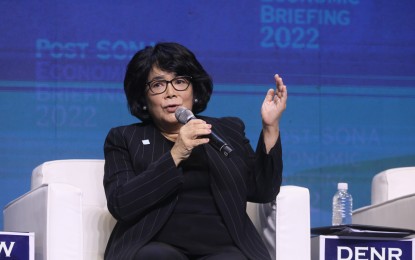
Department of Environment and Natural Resources Secretary Antonia Loyzaga. (File photo)
MANILA – Department of Environment and Natural Resources (DENR) Secretary Antonia Loyzaga highlighted the need to shore up biodiversity investments to establish the adaptive management and capacity of regions and communities, during the high-level segment of the 15th Conference of Parties to the United Nations (UN) Convention on Biological Diversity (COP15) in Montreal, Canada.
Loyzaga was designated by President Ferdinand R. Marcos Jr. as his representative and Head of the Philippine delegation which is composed of officials from the Philippine Embassy in Ottawa, Permanent Mission to the UN, Department of Science and Technology, Department of Tourism, Department of Agriculture, National Commission on Indigenous Peoples and experts from civil society.
In a press release posted on DENR website on Wednesday, Loyzaga reported the steps being undertaken by the Philippine government to address biodiversity and climate change challenges when she participated in the High-Level Panel on Financing Delivery of the Global Biodiversity Framework upon the invitation of the United Kingdom.
“More investments in science informed mainstreaming are needed to build adaptive management at the subnational down to the community level,” she said.
She added biodiversity finance will contribute to achieving the UN Sustainable Development Goals (SDGs) on reducing inequality, poverty, hunger, health, clean water and energy, decent work and economic growth, sustainable cities and responsible consumption and production, among others.
This is in addition to the goal of the DENR to attain SDGs 14 and 15 or life below water and life on land, respectively.
Loyzaga said the Philippines has already begun to align its official development assistance with “strategic goals” such as extending support to the 10-Point Agenda for Financing Biodiversity and the High Ambition Coalition.
These aim to address the complex and interrelated linkages between biodiversity, climate change, and inclusive, equitable, and resilient development.
In addition to the Philippines’ international environmental commitments, she said the Philippine government has partnered with the One Planet Initiative to explore the potential development of a biodiversity credits market in the country.
As part of its local initiatives, she said the Philippines, through the Department of Finance (DOF), has built a Sustainable Finance Ecosystem, which has garnered strong support from the UK.
Loyzaga said the framework has enabled collaboration among the DOF, the Securities and Exchange Commission, the Bangko Sentral ng Pilipinas, and the private sector in investing in enterprise risk management, ESG reporting, and the issuance of government and private green bonds.
She announced the Philippines has started the establishment of a national natural resource geospatial database and a natural capital accounting system which will aid in the prioritization of investments and actions.
Loyzaga said the Philippines has also instituted a climate change tagging system in its national budget and crafted legislation on the protection of millions of hectares of forests, wetlands, caves, mangroves, and reefs.
“We have adopted a whole of society and systemic risk-based approach where multilateral development banks and the private sector have a key role in achieving sustainable development, nature-based solutions and climate action, and the valuation of ecosystem services,” she said.
Loyzaga also stressed that cultures, livelihoods, and the resilience of the Philippines’ developing economy relies on the integrity of its ecosystems and the services they provide. (PNA)
